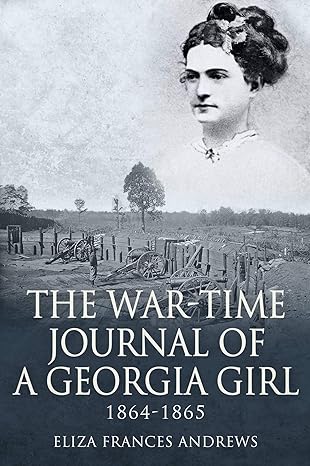Eliza Frances Andrews
Andrews' was a writer, newspaper reporter, editor, columnist, social critic, scientist, and educator. She is primarily known as a journalist for her firsthand accounts documenting the challenges and upheavals faced by Southern society during this pivotal period in American history.
Eliza Frances Andrews' writing reflects the attitudes and beliefs prevalent in the society of her time, which included the prevailing notions of racial hierarchy and white supremacy common in the antebellum and postbellum South. While her works contain elements that reflect these attitudes, it's essential to consider them within the context of the era in which they were written.
Andrews' writings often depicted the antebellum Southern society's values, traditions, and social norms, which included the entrenched system of slavery and racial segregation. Like many Southern writers of her time, her works perpetuated stereotypes and upheld the ideals of white supremacy inherent in the society she lived in.
As the Civil War engulfed the nation, Eliza Frances Andrews found herself in the midst of the conflict, witnessing firsthand the impact of war on Southern society. She chronicled her experiences and observations in her diaries, providing valuable insights into the daily lives of Southern women and families during this tumultuous period. Through her writings, Andrews captured the spirit of resilience and determination that characterized the Southern populace.
In addition to her literary pursuits, Eliza Frances Andrews actively participated in relief efforts to support Confederate soldiers and their families. She volunteered her time and resources to knit clothing, roll bandages, and provide comfort to wounded soldiers, demonstrating her unwavering commitment to the Confederate cause.
Eliza Frances Andrews' writings played a significant role in documenting the experiences of Southern society during the Civil War and its aftermath. Her works continue to be studied and appreciated for their insights into the complexities of Southern life and culture during a pivotal period in American history.
Some of her significant writings include:
- "The War-Time Journal of a Georgia Girl": Andrews' memoir, written during the Civil War, provides a firsthand account of life in the South during this tumultuous period. The memoir offers valuable insights into the daily struggles, challenges, and experiences of Southern women and families affected by the war.
- "The Two Prisoners": This novel, published in 1875, is set during the Reconstruction era and explores themes of loyalty, redemption, and forgiveness in the aftermath of the Civil War. The novel reflects Andrews' keen understanding of Southern society and her insights into the complexities of post-war life.
- "A Family Secret": Andrews' novel, published in 1889, delves into the intricacies of family dynamics and secrets in the antebellum South. The novel explores themes of identity, morality, and societal expectations within the context of Southern aristocracy.
- "Memories of My Life": Andrews' autobiography, published posthumously in 1930, offers a comprehensive account of her life and experiences, spanning from her childhood in Georgia to her later years as a writer and social activist. The autobiography provides valuable insights into Andrews' personal journey and her contributions to Southern literature and society.



